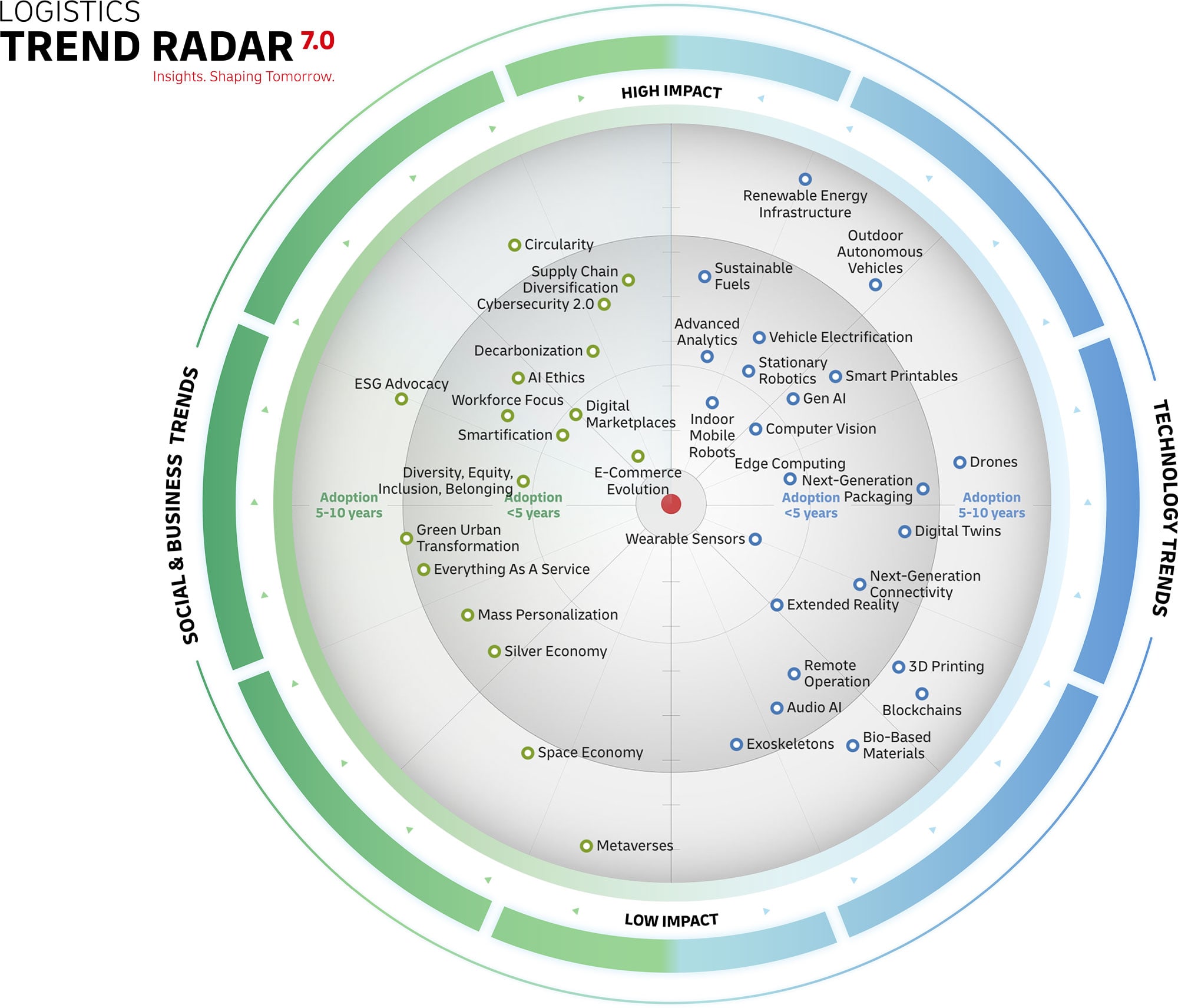The Logistics Trend Radar 7.0 - Insights. Shaping Tomorrow

The Logistics Trend Radar 7.0 - Insights. Shaping Tomorrow


The Era of Logistics is here.

Insights. Shaping Tomorrow.

What's New
The DHL Trend Research team has been closely monitoring key technology as well as social and business trends for over a decade. Every two years, the team updates the Logistics Trend Radar to reflect our perspectives on the development of existing and newly emerging trends, and how they impact logistics as a whole.Since publication of the previous edition of the Logistics Trend Radar in 2022, we have witnessed several relevant developments that influenced both trend adoption and trend impact. This has changed the position of some trends in the radar. Additionally, through countless engagements with customers, colleagues, and partners, we have identified new trends to drive enhanced discussions and accelerate collaboration on logistics innovation. Overall, this has altered the composition of this latest publication, the Logistics Trend Radar 7.0. There is more focus on trends identified with an adoption timescale of five years or less, as well as showcasing noteworthy developments in artificial intelligence (AI) and in sustainability.
The basis of the Logistics Trend Radar is DHL’s customer-centric, integrated approach which empowers us to harness the perspectives of our valued customers along with those of DHL colleagues who are on the ground daily, driving and experiencing the transformation of logistics. We complement these insights using classic research methodologies and incorporate the viewpoints and assessments of multiple experts, including key opinion leaders from influential think tanks, renowned consultancy firms, and top-tier academia from around the world.
Overview of Changes

Our Innovation Approach
It is our core belief that delivering impactful innovation in logistics can only be achieved by staying close to customers, close to technology, and close to operations.
We cultivate open conversations and engagement with our customers about business strategies, future needs, and challenges in order to validate ideas, develop use cases, and leverage technologies and expertise. We achieve success through strong customer buy-in and close collaboration across our innovation ecosystem.
We are driving the transformation of logistics by tracking and engaging visionary developers and providers across industries and by staying at the forefront of emerging technology and supply chain innovation. This enables us to identify and co-create new solutions beneficial to our customers.
We leverage our own global DHL logistics operations to improve efficiency, quality, sustainability, and safety. Our commitment to spending substantial time on-site with facility managers and workers is testament to our dedication in visualizing and implementing solutions that yield benefits for both our valued customers and colleagues.
Our end-to-end innovation approach starts with thought leadership and continues through customer engagement, technology scouting, and research, all of which enables us to identify and understand technological breakthroughs.
This is the foundation of the Logistics Trends Radar and of many other DHL thought leadership trend reports. With a finger on the pulse of relevant trends, we run proof-of-concept projects in real-world supply chain settings with our customers and within the DHL network of operations to fully understand application benefits and challenges. Successful projects open up opportunities for productization and scaling, so that these solutions are available internally across DHL operations and commercially to our customers.
Trend Research Innovation Funnel

The Team

Innovation & Trend Research

Global Portfolio Lead


Innovation & Content
The DHL Innovation Center Network
With our four DHL Innovation Centers located in Germany, Singapore, the US, and the UAE, we spearhead the future of logistics and drive customer-centric innovation around the world. This global network enables us to consider regional socio-economic differences and actively participate in local innovation ecosystems.
Every year, we welcome tens of thousands of customers, partners, and other innovative thinkers and visionaries to engage with DHL experts and each other. Through these creative hubs, we facilitate and lead workshops, innovation center tours, events, and joint innovation projects to better understand customer needs and identify actions to solve key supply chain challenges. We also take a focused, user-centric, and systematic thought leadership approach to discovering impending developments, emerging best practices, potential industry applications, and the implications of these trends on logistics. Leveraging customer insights and research findings, we test, create, customize, commercialize, and scale innovative solutions for the benefit of our customers and our colleagues.
Download The Full Logistics Trend Radar 7.0
Logistics Trend Radar 7.0 PDF
Download
(967.5 KB)

Stay Connected
Sign up for the DHL Innovation Insights newsletter for more trends direct to your inbox.
Yes, sign me up!Core DHL Research Team
André Hartig, Jordan Toy, Tanja Grauf, YingChuan Huang
Other Contributors
Abdulla Fayis, Akihiro Tan, Amy Taylor, Andre Keune, Angela Hills, Bastiaan Snaterse, Bachi Spiga, Ben Gesing, Benjamin Dippolito, Bjoern Krause, Brian Gaunt, Corinna Klempt, Dave Allcott, Dina Falk, Dirk Zimmermann, Eva Mattheeussen, Florian Schwarz, Franz von Bismarck-Osten, Holger Schneebeck, Irina Albanese, Jill Yu, Joan Eva Sainte Claire, Joan-Wilhelm Schwarze, Jordan Racek, Kristin Szekat, Lars Pappe, Loic Bosch, Matthäus Pruski, Maurin Broil, Max Franck, Michael Lai, Niki Frank, Noah Tombs, Obie George, Paul Schlinkert, Peter Rolfes, Philip Jensen, Prerit Mishra, Richard Foster, Robert Jeffrey, Samer Kaissi, Sebastian Lamberts, Tim Tetzlaff, Tobias Maier, Wieland Mundt, Yung Chiun Ooi, Zineb Darkouch
Steering Committee
Christopher Fuss, Senior Director, Head of DHL SmartSolutions IoT
Olande Stols, Vice President Marketing, DHL Customer Solutions & Innovation
Stefan Fuehner, Vice President Strategy & Commercial Development, DHL Customer Solutions & Innovation
Thomas Dammann, Vice President Sector Development, DHL Customer Solutions & Innovation
Special Thanks
Special thanks go to all our colleagues from the various DHL teams and divisions – Supply Chain, Express, Global Forwarding, Freight, eCommerce Solutions, and Post & Parcel Germany – who supported us with invaluable input and expertise. We additionally would like to thank our external partners, including consultancies and academia, providing further valuable insights that shaped this edition of the Logistics Trend Radar. Furthermore, we would like to express our sincere thanks to all our customers, partners, and colleagues who visit our DHL Innovation Centers every year and share their knowledge in workshops, tours, events, and trend insights sessions.
Brand Design & Marketing Agency
THE STUDIOS excellence in brand design GmbH
Editorial Support
Words Europe






